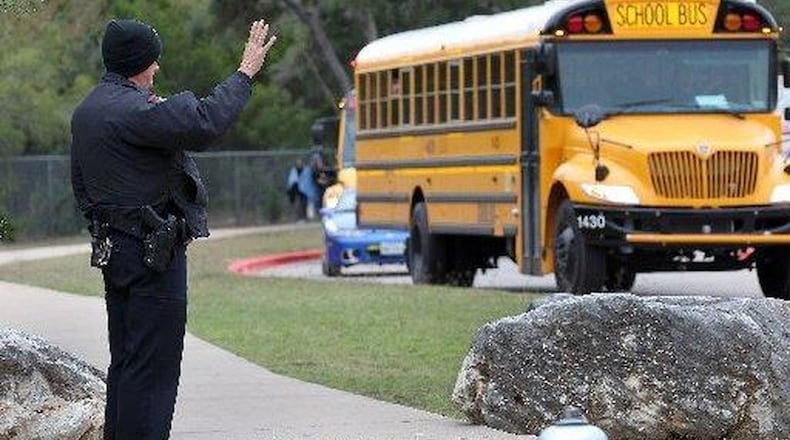It’s all about the kids!
Whenever you hear that, hang onto your wallet.
For a few years, some north DeKalb County cities have been at odds with DeKalb’s school system about installing speed detection cameras in school zones.
Five years ago, the state legislature OK’d the use of Camera Cops for school zones. The idea is simple: Drive too fast near a school, a 25 mph speed limit, and the cameras will capture your tag and a ticket gets mailed off to you.
The legislature, in its wisdom — its political wisdom, that is — limited such ticketing to school zones. That’s because Georgians believe in their God-given right to speed and have flesh-and-blood cops try to catch them.
Speed cameras are downright sneaky. But, most people are OK with that. As long as it protects the youths.
More than 40 districts statewide have been approved by the Georgia DOT for the cameras at about 240 schools.
So in 2020, the cities of Dunwoody and Brookhaven voted to install cameras near some schools within their city limits. State law mandated that cities or counties must approve the installation of cameras, and so must the local school system.
But after the two cities voted . . . crickets.
Apparently there has been some discussion between the cities and DeKalb schools. But there’s been no agreement and no sign-off from the schools. So, no cameras.
Last January, police chiefs from Brookhaven, Chamblee, Doraville and Dunwoody held a press conference to complain that the school district was ignoring them.
The school district responded with the kind of vague statement school officials excel at crafting: “Safety can only be achieved through an equal partnership with local law enforcement to ensure decisions about where Automated Speed Enforcement (ASE) is conducted are equitably and fairly made throughout DeKalb County. Thereby ensuring the initiative is more than a revenue-generating tool.”
Then more crickets.
The district’s comment about being a “revenue-generating tool” is not wrong.
In 2019, some of the cities noted above did studies and found that hundreds and even thousands of cars were speeding past each of the schools every day. Multiply those numbers by $75, the fine for a first offense, and you’re talking some real coin here.
The split would have 35% go to RedSpeed, the purveyor of the Camera Cops, and the local entity would keep 65%. The local government must provide a real cop to review the camera-generated photos and say, “Yup, that car is speeding.”
A 2021, an AJC story said Gwinnett County and four cities in Gwinnett were on pace to collect more than $7 million that year.
Dunwoody Police Chief Billy Grogan agrees the cameras could be lucrative, but only for a while.
“Initially, you’d get a lot of tickets but pretty quickly they’d go down,” he told me. “People will change their behavior.”
He saw it when he was a Marietta cop and red-light cameras caused the number of red-light runners to plummet.
Red light cameras have since waned in popularity after lawmakers demanded longer yellow lights, which caused a drop in tickets. And revenue.
Grogan is frustrated by the school district’s lack of buy-in. “Three years later, we’re still dealing with this,” he said.
He said the district had concerns the cameras would disproportionately affect people of color. But, he responded, “the cameras are unbiased as can be. They photograph tags, not people. The people who get tickets are those who are speeding.”
The issue resurfaced last week when the news site Decaturish noted that the district wants to get the law changed so “a major share of any funds collected must be used for improvements to school safety.” Also, they want school police to be the administrative agency and monitor the cameras.
“To me, it’s never been about the money,” said Dunwoody Mayor Lynn Deutsch. “It’s just a tool to get people to slow down.”
Deutsch said the school district was always vague about its foot dragging, “but now they’re saying it’s about the money.”
Chief Grogan said Dunwoody offered 5% of the take to the schools — meaning it would keep 60%. He said the streets being monitored don’t even belong to the school district.
The school board brought up the issue at its meeting Monday but discussion was largely quashed by the new board Chairman Diijon DaCosta.
Board member Allyson Gevertz tried to get a conversation going, saying the issue is public, complicated and has been in the works for a while. The board’s policy is to have the chairman do most of the talking. But he didn’t respond to me.
“I think if this happens, the money should go to school safety, things like crossing lights, panic buttons in schools, better striping,” Gevertz told me.
Currently, state law says ticket money goes to the city or county “to fund local law enforcement or public safety initiatives.”
Marshall Orson, who just left the board, said the cities’ offer of 5% is “absurd.” However, he added, the cities, by law, are in the driver’s seat in the matter.
“If it’s not about the money for the cities, then why not have the bulk of the money go to school safety?” he told me. “That’s reasonable right?”
Reason often doesn’t count in such matters.
About the Author
Keep Reading
The Latest
Featured




